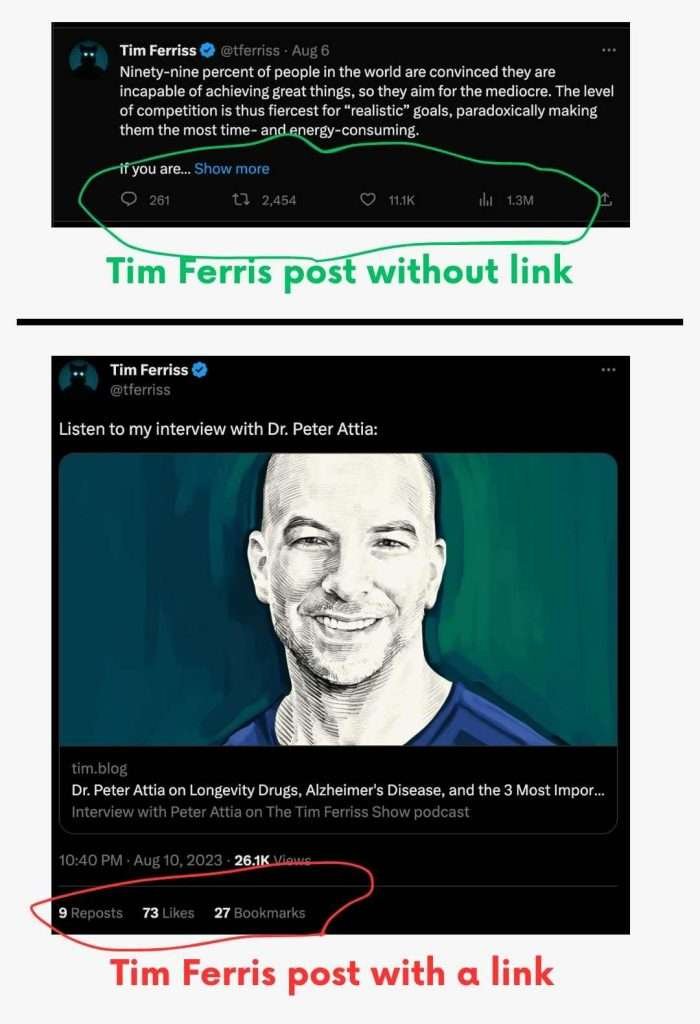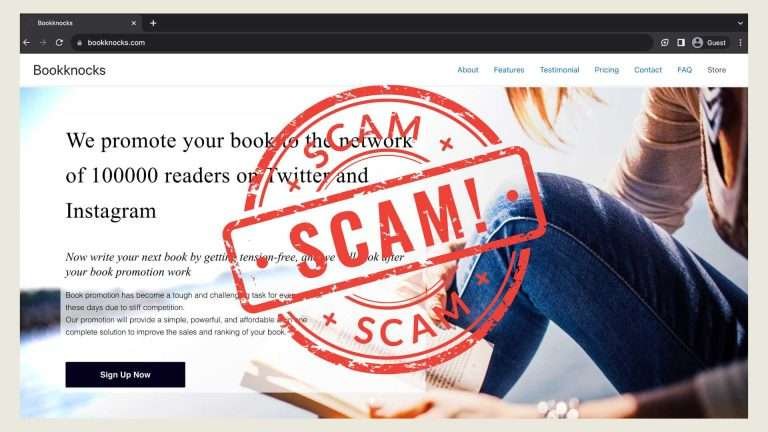A Book Marketing Scam That Is Eating Author’s Money

Ever received an email like this?
Hey,
I will promote your book to my thousands of followers on Twitter. Visit this link to sign up for my services. And blah, blah, blah.
Beware, my friend…
You might be on the verge of getting scammed.
But don’t worry. In today’s post, I will expose this book marketing scam that’s become widely popular and help you avoid falling for it.
Let’s get started.
Understanding the Twitter Book Marketing Scam
Have you heard of the Twitter book marketing scam?
Thousands of websites have sprung up, eerily reminiscent of mushrooms after rain. These sites reach out to authors via email, promising to promote their books to thousands of Twitter followers.
The catch? In reality, many of these so-called “promotion” sites have zero or few followers.
Some unsuspecting authors, without verifying these claims, hurriedly visit these websites and make payments, believing they’re investing in valuable marketing. The cost for such services is typically minimal, ranging from $20 to $40, which might make it seem less risky or more attractive.
After payment is made, some of these scammers vanish without a trace. If they do honor their word, their tweets often reach a fraction of the promised audience—resulting in zero sales for the author. To make matters worse, the author typically has no recourse. Within days, many of these scam sites disappear only to reemerge under a new name, ready to deceive another batch of hopeful writers.
Root Cause of This Book Marketing Scam?
Every self-published or traditionally published author wants to reach as many readers as possible. However, writing and marketing your books on your own can be a daunting task. Moreover, life is happening on the other side. Many indie authors don’t have a budget for marketing. Yet, the desire to reach new readers never fades. In this scenario, a scammer’s email pops up. The author sees a glimmer of hope, and the promised results are quite impressive. So, the author visits the website, and the low price seems like an easy risk to take. But remember, cheap things often come at a quality cost.
Here are 3 solid reasons why this scam works:
- Dream – The hope of reaching new readers and selling more copies.
- Pain – The frustration of books not selling and having no time for marketing.
- Cost – The allure of affordable marketing.
The Author Knows the Truth
The author always knows the truth, yet the allure of lucrative deals often sways their judgment. After all, can you really reach hundreds of thousands with just $20? It might sound too good to be true. The enticing low cost can blind the author. But then, what’s the harm in trying? Result: on the way to a new book marketing scam.
Like What You Are Reading?
If you are getting value from this post then please subscribe and we will send informative posts like this one at your best email.
- Learn to effectively market your book on social media.
- Learn to build readership in the crowded space.
- Learn to build an effective email list of readers.
- Learn to build author website that converts.
- Latest updates, discounts and news from publishing industry.
We never spam or sell our list and you can subscribe with confidence.
The Big Problem with Twitter and Other Social Media Platforms
Twitter significantly diminishes the reach of posts containing links. If you tweet a link, its visibility will likely be reduced.
Why is this? Twitter, like many social media platforms, wants to keep users engaged within its ecosystem. External links encourage users to leave, and this goes against the platform’s objectives. Consequently, promoting books or other products through direct links often proves ineffective. This remains true whether you spend $20 or $200 on your promotion. This rule of thumb is consistent across various social media platforms.
You can check the example below with the image of two different tweets by Tim Ferris. Image 1 is the tweet without link. It reaches more than one million readers with getting more than 11 thousand likes. However the 2nd image shows the post with link with reaching only 26 thousand readers and getting 73 likes.
Can you see the huge difference?

In some instances, sharing links may result in a few sales. For example, if Stephen King or another renowned author with a massive following were to tweet about your book and express his appreciation, there’s a higher likelihood that it’ll catch attention. This scenario becomes even more probable if your book aligns with the genre Stephen King is known for, and his followers, being avid readers, decide to give your work a try. Even in such situations, however, one should still remain realistic about the number of copies they can expect to sell.
Beware of Small Money Traps
Book marketing scam sites often lure authors with their low costs, sometimes as little as $10 or $20. These seemingly reasonable prices can quickly ensnare authors, especially those without a marketing budget. This phenomenon is known as the “small money trap.”
Authors may perceive the risk of trying these services as minimal due to the low cost. However, the real risk emerges when they don’t achieve the expected results. After making the payment and not seeing a return on investment, many authors shrug it off. After all, who wants to go through the hassle of reclaiming just $20? As time passes, the experience fades from memory, and the author moves on.
Contrast this with a scenario where an author has invested $200 or $400. With a more significant amount at stake, an author would likely be more vigilant. They might scrutinize the marketing efforts more closely or even initiate a chargeback or PayPal dispute. But when the sum is small, many let it slide, allowing the unscrupulous to move on to their next victim.
To prevent falling victim to such tactics, it’s crucial to remain vigilant, both in life and in marketing. Avoid small money traps and always prioritize value over cost.
Are All Tweeting Services a book marketing Scam?
The answer is both Yes and No.
No, when a Twitter book marketing service:
- Has real followers, which you can verify on their website.
- Does the promised work and showcases genuine testimonials.
- Provides you with detailed reports for review.
Yes, when someone claims to have 100,000 followers who are all readers. It might be true that they have 100,000 followers, but if they assert that all those followers are readers when, in reality, many are just bots or random individuals, then it’s deceptive and can be considered a scam or fraud.
Here’s something to ponder: I read works by Neil Gaiman and Stephen King, and I follow both of them on Twitter. However, I don’t follow any book tweeting service. Does that rings any bells to you?
How to Avoid any book marketing Scam?
Considering hiring a book tweeting service? Keep these pointers in mind:
- Report Suspicious Emails: Always report suspicious emails. Question why someone with millions of followers would email you for a service. If their Twitter reach is genuinely effective, they can simply tweet about their service.
- Inspect Social Media Accounts: If you stumble upon their website, examine their social media profiles. Authentic Twitter marketing services will display their accounts prominently on their site. Make sure to verify the number of followers by directly visiting their Twitter or other social media pages. Does their follower count match their claims, or is it exaggerated? Remember: Book marketing scam sites often avoid listing their genuine social media accounts on their websites.
- Beware of Fake Testimonials: Many book marketing scam websites showcase fabricated testimonials. These might include counterfeit images accompanied by fictitious names. A quick search often reveals that these authors don’t exist. Some scammers even escalate their deceit by using real photos of random authors, accompanied by made-up endorsements. Would you confront them to verify the authenticity of these testimonials?
- Look Out for Poor Design: Book marketing scam websites often lack a professional design touch. Their layouts can feel disjointed and less intuitive.
- Spot Writing Errors: Keep an eye out for numerous grammatical and spelling mistakes on the website. Such errors can be telltale signs of a less-than-legitimate operation.
I Think I’ve Been Scammed. What Should I Do Now?
If you suspect you’ve fallen victim to a book marketing scam after making a payment to a dubious website, take a moment to reevaluate the situation. If the site doesn’t have the number of followers they promised, here are a few actions you can consider:
- Chargeback: Initiate a chargeback or open a PayPal dispute. This can help in recovering your money. Inform PayPal that the website didn’t deliver on the number of followers they promised.
- Expose Them: Let them know you’re prepared to share your experience on social media and alert the broader community. This could motivate them to rectify their mistake and refund your money.
- Uncommit: In the book “Essentialism,” there’s a chapter titled “Uncommit.” It discusses the idea that sometimes we become overly attached to our past decisions. If you realize you’ve been scammed, it’s essential to acknowledge the mistake, learn from it, and move forward. Be more cautious and vigilant next time.
How Do I Market My Book?
- Leverage Social Media: Share posts about your books on your social media platforms and ask friends to do the same. Engaging your network can amplify your reach.
- Run Affordable Social Media Ads: Consider running a $20 ad on social media platforms. Often, managing your own simple ad campaigns can yield better results than falling for dubious marketing offers. (If you’re unsure how to do this, let me know in the comments, and I might write a post explaining the process.)
- Utilize Amazon Ads: Instead of handing money over to questionable marketers, allocate that budget to Amazon ads. It’s a platform where your target readers are already searching for books.
- Invest in a Quality Book Trailer: Videos typically perform well on social media and can help you stand out. Rather than wasting funds on ineffective marketing tactics, consider investing in a captivating book trailer. It’s a timeless asset for your marketing toolkit.
- Build Your Own Audience: It’s crucial to engage with readers who share your interests. Start by consistently creating content on platforms like your personal blog, Medium, or Twitter. Over time, you’ll foster a community genuinely interested in your work.
These are just a few effective ways to promote your book. If you’re interested in delving deeper into any of these methods, drop a comment below. I’m considering writing detailed posts on each strategy.
What Should You Do After Reading This Post?
The objective of this article is to protect you from falling prey to book marketing scams and to guide you in allocating your funds wisely. A valuable tip I’d like to share is: instead of spending money directly on marketing your book, invest it in building your own audience.
By cultivating an audience, you can promote your book to them repeatedly without any additional cost.
Why Does This Matter?
If you found this article helpful, please share it with others who might benefit from it. Raise awareness by sharing this post on your social media platforms and help protect fellow authors from being duped by scams.
I’d love to hear your thoughts in the comments section.
If you’re interested, let me know if you’d like me to delve deeper into exposing more scams like this one and uncover new, cost-free book marketing strategies and case studies.
Like What You Are Reading?
If you are getting value from this post then please subscribe and we will send informative posts like this one at your best email.
- Learn to effectively market your book on social media.
- Learn to build readership in the crowded space.
- Learn to build an effective email list of readers.
- Learn to build author website that converts.
- Latest updates, discounts and news from publishing industry.
We never spam or sell our list and you can subscribe with confidence.





